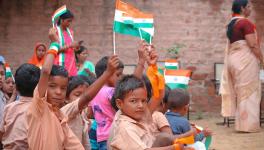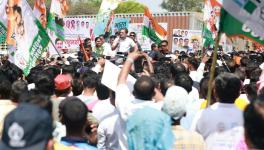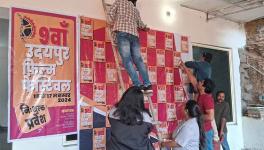Palghar Lynching: Who are the People Accused of Killing Two Sadhus and their Driver?
For the first time in many years, Sumitra Rao won’t be able to harvest her annual rice crop this season. Her family only farms once a year. “We don’t take winter crops,” she said. “As we don’t farm throughout the year, this period is extremely crucial for us to survive. The rice we cultivate is only for self consumption. Our meals depend on that.”
Sumitra is a resident of Diwshi village in Maharashtra’s tribal district of Palghar. The village lies in the periphery of Gadchinchle, where the mob lynching of two sadhus and their driver took place on April 16. Sumitra’s husband Ganesh and brother-in-law Vasant are in jail for allegedly being part of the mob that killed the three people.
“We can’t make up for what the two of them did,” she said tearfully. “Rice is a labour-intensive crop. This entire season will be wasted. We have not been able to do anything this year.”
Ganesh is also one of the five people named in a story published by The Organiser, the mouthpiece of the RSS. Four days after the lynching in the Gadchinchle village, the story had claimed that the Communist Party of India (Marxist) was behind the incident and that the five main accused, including Ganesh, are “said to be activists of CPM”. The other four were Jairam Bhavar, Mahesh Rawate, Sunil Rawate, and Ramdas Asare.
This reporter visited the families of the five people named in the story. Family members of all the five people said they have absolutely no affiliation with any political party. The residents in the villages corroborated their claim.
On the contrary, they belong to extremely marginalised tribal families, living in abject poverty. They make their ends meet via farming and labour work. And they fell for sick rumours out of their digital illiteracy.
The two sadhus, Kalpavruksha Giri, 70, Sushilgiri Maharaj, 35, and their driver Nilesh Yelgade, 30, were assaulted in Gadchinchle village located in Dahanu Taluka – 140 kilometres north of Mumbai – while they were on their way to Surat from Mumbai. The sadhus did not have necessary permits to travel during the nationwide lockdown announced on March 24 and had taken the interior route to avoid being frisked at the police checkposts on the highway.
But a forest guard stopped their car near Gadchinchle, which lies on the border Maharashtra shares with the union territory of Dadara and Nagar Haveli. While negotiating with the guard, a mob of 400 assaulted them and lynched them to death. The mob consisted of people from various hamlets from three villages. Majority of them belong to the Warli tribe. They had been petrified by the rumours raging in the area.
Days before the incident, the WhatsApp groups in the area had been relentlessly buzzing with messages of “Muslim-looking child kidnappers” roaming free, which had spread tremendous panic.
Ursha, 23, wife of Sunil Rawate, who is one of the 150 plus arrested in the case, told NewsClick, “For a week before the incident, people would sleep outside the hamlet to keep an eye on the possible child-lifters. This was the case across the taluka of Dahanu. At night, you could see people patrolling the route that led to their villages. Everybody was scared. People had panicked.”
The residents carried sickles and sticks with them while sleeping outside at night. “All of us fell for the rumours,” Ursha said, sitting in her dimly lit shanty. “We were at home on the night of the incident. We heard a commotion; so, Sunil went out to check what was happening. [...] He was at the spot. Whatever happened that night was unfortunate.”
Speaking of politics, Ursha said, “We are too busy ensuring two meals for our families. He worked as a welder or migrant worker after the cropping season ended. We have no time for politics.”
Palghar, with a population of nearly 30 lakh, is a predominantly tribal district with 37% Scheduled Tribe population, much higher than Maharashtra’s 9.4%. The district – barely 120 kilometers from Mumbai – is among the most backward in the state of Maharashtra. The various shades of green glittering in monsoons are unable to conceal the destitution in the district.
In Palghar’s Dahanu taluka, where Gadchinchle is located, almost 70% of the population comprises Adivasis. Being forest dwellers, not many have a land against their name. With lack of any irrigation facilities, they are completely dependent on rainwater for farming. In other words, they rarely cultivate winter crops.
The residents here do not cultivate rice to sell. It is mostly for self-consumption. When they are unable to take the crop, it jeopardises their meals.
With rice being cultivated largely for self-consumption, the residents rely on labour work after the cropping season concludes. They either work as daily wage workers in Dadara and Nagar Haveli or migrate to Thane to work at construction sites. “My son would leave around November and return in the summer,” said Shaila, Mahesh Rawate’s mother. “Even in Thane, there is no guarantee of work. He would land up at a known corner where workers gather and wait for a contractor to hire them.”
Shaila said Mahesh got work sporadically at Rs. 350 per day. “This is what our life is,” she said. “From where will we do politics?”
Mahesh, 19, is a resident of Kinhavli village not too far from Gadchinchle. His family resides in a hut on a hilly terrain. One has to cross two streams and engage in a bit of a trek through the green rice fields to get to his home. “Since Mahesh has been arrested, it has just been me and my husband at home,” said Shaila. “Mahesh’s wife is back with her parents after her baby died.”
A few days before Mahesh’s arrest, said Shaila, there were complications in her pregnancy. “She was seven months pregnant,” she said. “We tried calling for medical help, but it didn’t reach on time because our place is very remote. She delivered the girl in the house, but the baby died immediately. My daughter-in-law was too shaken, and she left for her parents’ home after that.”
Mahesh was with her on the night of April 16, said Shaila. “I don’t really know if he was at the spot where the lynching happened,” she said. “But I got to know of his arrest the next morning. I haven’t seen him since.”
While the families of the arrested regret what happened that night, The Organiser had accused Vinod Nikole, who is a CPM MLA from Dahanu, of being the “brain behind this incident”. The Maharashtra CID, which is investigating the case, has filed two chargesheets – each over 5000 pages – that suggest the claim could not be further from the truth.
Nikole said the right wingers first tried to communalise the lynching incident and then changed course after that trick failed. “The home minister and chief minister of Maharashtra have clarified that the incident happened because of rumours of child kidnapping,” he said. “There was nothing political about it.”
Incidentally, Chitra Chaudhary, the sarpanch of Gadchinchle, which is a BJP-backed gram panchayat has also refuted the claim made by The Organiser. “This was a completely spontaneous thing,” she told NewsClick. “The rumours had been raging in the area. And that led to the incident. Politics had nothing to do with it.”
An email has been sent to The Organiser on the morning of 14 August. The story would be updated when they respond.
Get the latest reports & analysis with people's perspective on Protests, movements & deep analytical videos, discussions of the current affairs in your Telegram app. Subscribe to NewsClick's Telegram channel & get Real-Time updates on stories, as they get published on our website.
























